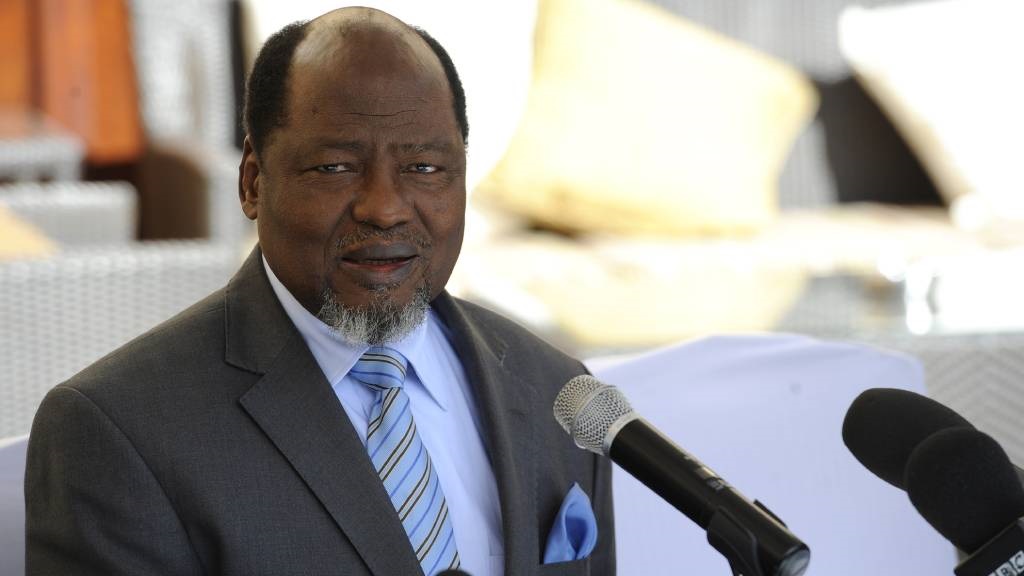

Joachim Chissano, head of the mediation of the SADC (Southern African Development Community) talks to journalists.
PHOTO: Stephane de Sakutin, AFP
- Former Mozambican president Joachim Chissano says challenges in Zimbabwe undermine southern Africa’s economic prospects.
- Zimbabwe’s combined bilateral and multilateral debt is R153 billion – mostly arrears.
- The African Development Bank says Zimbabwe should correct past political and economic ills.
Challenges in Zimbabwe, including its economic woes, are leading to “terrible consequences” for the southern African region and something must be done soon to change it, according to former Mozambican president Joachim Chissano.
Chissano, the facilitator of a high-level discussion on Zimbabwe’s bid to end its protracted standoff with its creditors and the international community, was speaking in Harare during the fifth round of talks.
African Development Bank (AFDB) president Akinwumi Adesina and Zimbabwean President Emmerson Mnangagwa also attended.
Chissano said: “The crisis in the country is having terrible consequences for the region as Zimbabwe lies at the heart of southern Africa.”
Zimbabwe is the gateway into southern Africa and regions situated further north for goods and services from South Africa. Road infrastructure linking the region via Zimbabwe has played an important role.
READ | ‘Protect our hard-won independence,’ Mnangagwa says as Zimbabwe turns 43
Lately, however, there have been attempts to bypass Zimbabwe, such as the opening of the Kazungula Bridge route for the movement of goods from South Africa into Botswana and further north. One of the reasons for this is that infrastructure development has been lagging behind in Zimbabwe, making it an unattractive passage.
“Many regional infrastructure development plans, including roads, railways and power transmission lines have been brought to a standstill as they have to run through the country (Zimbabwe). The continental free trade area is also undermined by the situation prevailing in Zimbabwe,” Chissano added.
Zimbabwe owes international creditors about R162 billion ($8.5 billion). Arrears make up 69% of the bilateral debt, which totals $5.7 billion. Similar to this, 91% of the $2.6 billion in multilateral debt is made up of targeted sanctions from the European Union (EU) and United States (US).
Adesina said:
Economic sanctions are driving Zimbabwe further into unsustainable debt.
However, fully aware of the reason behind the sanctions imposed at the turn of the millennium when, under the late president Robert Mugabe, democracy, human rights and the rule of law were undermined, Adesina noted that Mnangagwa had made some progress in correcting past ills.
“The past is hurting the present and the future of Zimbabwe,” he said.
“I wish to thank you, Your Excellency, President Mnangagwa for your determination to resolve well-known historical issues that led to the imposition of economic sanctions on Zimbabwe. Yes, it is the right thing to do, as two decades of sanctions have compromised the quality of life of the people of Zimbabwe,” he added.
Address governance issues
Zimbabwe is headed for elections, which are expected to be held in August.
Politics is central to the country’s prospects.
Adesina stated that for the country to move forward, governance issues should be taken seriously.
“The issues are not just economic or financial. They also involve governance, rule of law, human rights, freedom of speech, political level playing field, electoral reforms that will assure free and fair elections; as well as fairness, equity and justice for the commercial farmers and other businesses who were dispossessed of their lands, for which there is a clear need for restitution and compensation,” he said.
Want to discuss hotly debated topics with someone from across the world? Sign up for our global dialogue programme and get matched for a conversation
The high-level discussions on Zimbabwe also include working groups on economic governance; land tenure reforms, compensation under the Global Compensation Deed and the Bilateral Investment Promotion and Protection Agreements.
Compensation for farmers
The Zimbabwe government promised in 2021 to pay about R67 billion ($3.5 billion) to more than 400 white commercial farmers who lost their land during chaotic land reform.
The money was due to come from profits made through mining. Platinum and gold are the major export minerals.
However, the government has fallen short on this promise, which could erode trust and confidence in the government.
“Further delays in paying the compensations could erode trust and confidence. So, timing counts; responsiveness counts; and financial sustainability counts. We need a greater sense of urgency on this issue,” Adesina added.
The News24 Africa Desk is supported by the Hanns Seidel Foundation. The stories produced through the Africa Desk and the opinions and statements that may be contained herein do not reflect those of the Hanns Seidel Foundation.
